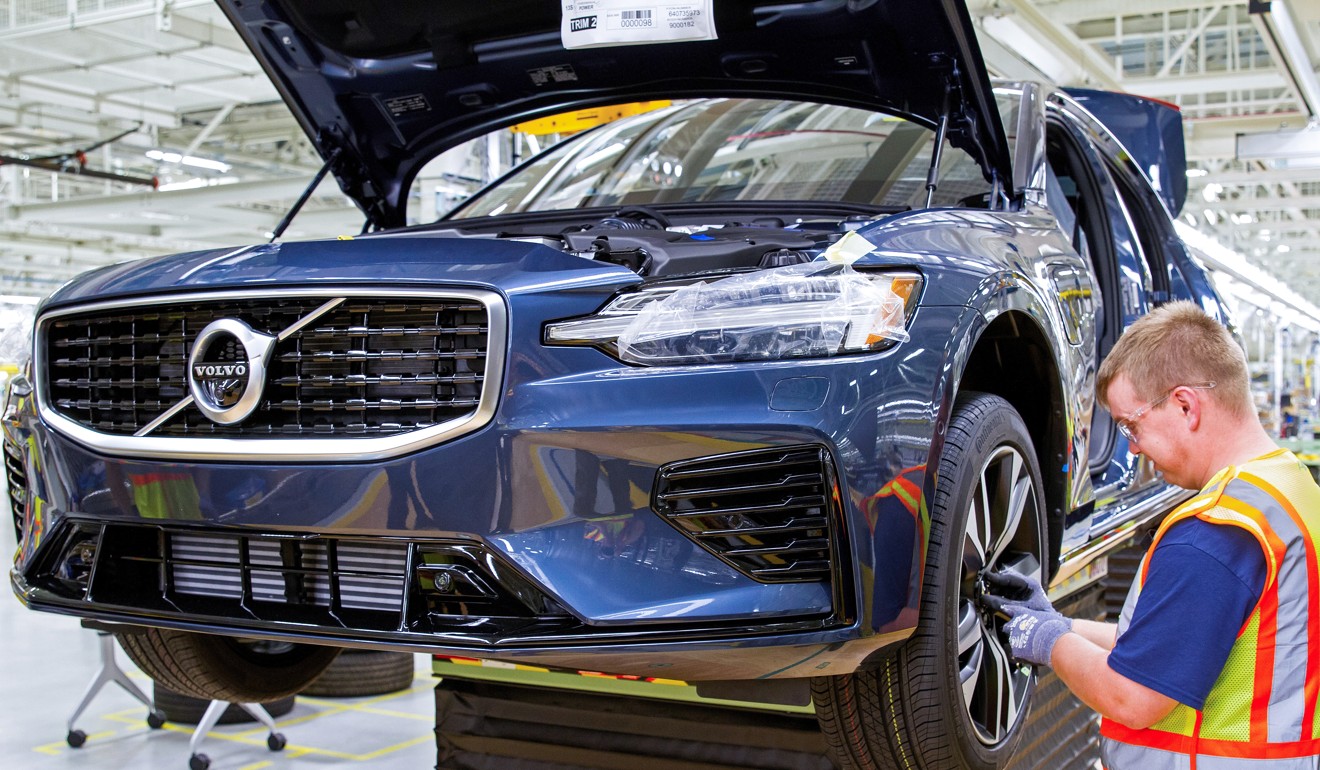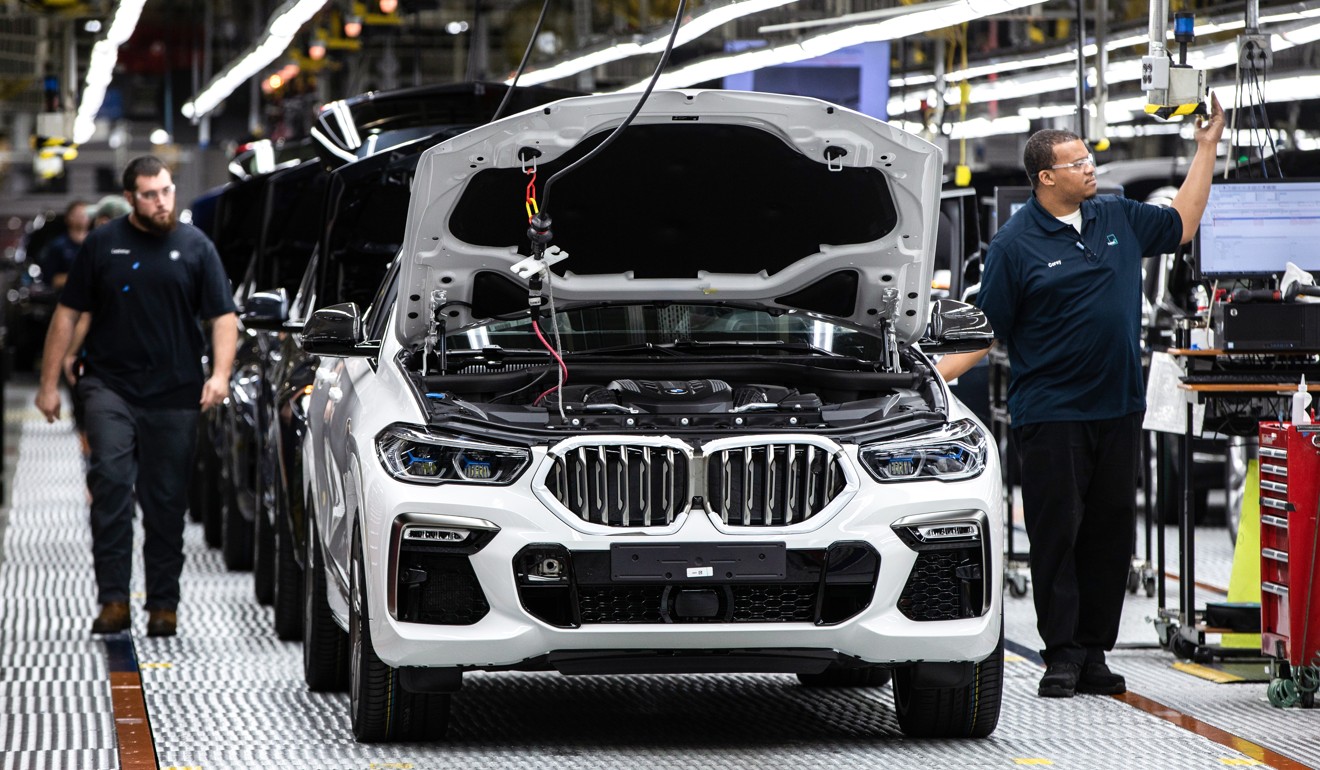Trade War: Export-dependent South Carolina finds itself caught between its No 1 sales market and White House policies
- China has been the state’s largest export market for manufactured goods since 2013, displacing Germany and Canada
- Companies are taking longer to decide whether to locate plants, expand production as a result of the trade war, state and local officials say

Nestled in the foothills of the Blue Ridge Mountains between Atlanta and Charlotte, Greenville County was the heart of textile country in South Carolina for much of the 20th century.
Many of the spinning rooms in the area are now gone, replaced by advanced manufacturing ranging from power-generating turbines for General Electric to sport utility vehicles (SUVs) for German carmaker BMW in neighbouring Spartanburg County.
The transformation – and health – of the local economy is a testament to the efforts state and local officials have made in the past quarter-century to attract international investment and diversify South Carolina’s manufacturing base. Unemployment is at a record low and per capita income has steadily risen statewide since the global financial crisis a decade ago.
Not all is rosy, however. South Carolina, in the southeastern US, has found itself caught in the cross hairs of the trade war that has raged between the country and China for the past 18 months.
The dispute has cast a pall over recruitment efforts, with international companies hesitant to make long-term investments, as uncertainty over the trade war outcome lingers, state and local officials said. It also has pressured the trading relationship with South Carolina’s largest export market: China.
As the two countries prepare to sign a “phase one” agreement on Wednesday, South Carolina officials are hopeful the truce will give companies more certainty about the future and help prolong what has been a period of unprecedented growth in the state.
“It takes a long time to establish those relationships,” Knox White, the mayor of Greenville, said.
“The disruption of those relationships and how far-reaching that will be, whether they can be repaired and how long it would take to repair them, those are consequences we will be living with no matter if everything was over with tomorrow,” he said. “People move on.””
More than 400 companies from 34 countries call Greenville, Spartanburg and the eight surrounding counties that make up South Carolina’s upstate region home, including Chinese-owned Volvo Cars, BMW, French tyre manufacturer Michelin and Japanese electronics manufacturer Kyocera Mita.
With a population of 5.15 million people, making it smaller than Hong Kong, South Carolina has an economy that is one of the most reliant on exports in the US.
The state shipped US$34.6 billion of goods overseas in 2018, or the equivalent of 15 per cent of its gross domestic product, according to data from the Office of the US Trade Representative. Only the states of Louisiana, Texas and Kentucky were more dependent on exports that year.

BMW exports 70 per cent of the cars it produces at its plant in Spartanburg, while Volvo Cars, owned by Zhejiang Geely Holding of China, ships about half of its S60 cars from its plant in Ridgeville. Boeing assembles and delivers its 787 Dreamliner worldwide from Charleston.
The South Carolina Ports Authority handled a record 2.39 million twenty-foot equivalent container units and shipped 195,000 vehicles in financial year 2019, which ended in June. That represented an 8.8 per cent increase in container volume.
China also has become the largest export destination for South Carolina-made goods, outpacing Germany and Canada since 2013, according to US Census Bureau data. The state was the fourth biggest exporter in the US to China in 2018 and shipped some US$5.8 billion of goods to the mainland in the first 10 months of 2019.
Despite the state’s reliance on international trade, President Donald Trump – and his protectionist trade policies – remain incredibly popular in South Carolina, where he took nearly 55 per cent of the popular vote in the 2016 general election.
“Most companies that I talk to, they understand we need to address the issue with China, whether it’s around intellectual property or whether it’s around subsidisation of industries like steel,” said Ted Pitts, president and chief executive of the South Carolina Chamber of Commerce.
“A lot of South Carolina companies are supportive of the administration’s effort to try to get a level playing field with our Chinese partners.”
That does not mean those efforts aren’t painful for companies that manufacture here in the States, he added. “They’re hopeful that the two countries will come together and can work on an agreement that’s fair.”
Since July 2018, Trump has placed tariffs on hundreds of billions of dollars of Chinese-made goods as he tries to force Beijing to change decades of industrial and trade policy. China has responded in kind with its own retaliatory tariffs.
On the surface, the trade dispute does not appear to have dramatically hurt South Carolina’s economy.
Unemployment was at 2.4 per cent in November, its lowest level since state-by-state record-keeping by the US Department of Labor began in 1976. Per capita income rose to US$45,414 at the end of the third quarter of last year, representing a 43 per cent gain since wages last fell a decade ago, according to the US Bureau of Economic Analysis.
Housing starts rose 2.7 per cent year on year in November and South Carolina was on pace to easily surpass the value of its 2018 exports at the end of October.
Joseph Von Nessen, a research economist at the Darla Moore School of Business at the University of South Carolina, said growth “softened” somewhat in 2019, much like the US as a whole, but the state’s economy has proven to be “very resilient” to shocks from the trade dispute, so far. However, they have been more apparent in areas like manufacturing exports.
“The growth rate of export activity dropped off significantly in 2018, primarily as a result of a 40 per cent tariff on US autos that was put in place by China in the summer of 2018 and that was rolled back in early 2019,” Von Nessen said.
“ Since then, export activity has slowly been working its way back in terms of the overall rate of growth. It has not yet hit that pre-July 2018 level.”
So far in the 2020 financial year, the cargo volume growth at the state ports authority has slowed to 5 per cent. The number of empty containers it ships overseas after unloading, primarily back to Asia, has grown “exponentially”, according to Jim Newsome, its president and CEO. The volume it moved out of Charleston and its inland ports rose 32 per cent in financial year 2019 as the trade war intensified.
“There are very few foreign direct investment projects right now. So, and you say, well, why?,” Newsome said. “I just think uncertainty is kind of the enemy of a big investment basically. If you look back in five years and you say what is the impact of this trade war, I would say the answer to that for me will be what happened to foreign direct investment in manufacturing.”
Companies are taking longer to decide whether to expand production or make future investments against the backdrop of the trade war, officials said.
“The main difference is that companies’ decision-making process is lengthened – they are looking but waiting to make a final decision,” Alex Clark, a spokeswoman for the South Carolina Department of Commerce, said.
Frank T. Davis III, a lawyer at Haynsworth Sinkler Boyd in Greenville, said it is not just Chinese companies that are rethinking whether to locate in the US, but European companies as well.
“The trade issues make it very difficult to plan for investment in long-term capital expenditures because you had what was already in a global, very competitive economy; you had some fairly nuanced economic decisions that are now being clouded by the trade uncertainty,” said Davis.
“If you had a clearer idea of underlying policies, it would be easier to plan for that. This one is just particularly hard because it sort of depends sometimes on what side of the bed somebody has gotten up on.”
In light of the trade dispute, some companies have shifted part of their production out of South Carolina, while others have sought new suppliers or borne the higher costs of raw materials and components.
Volvo, which opened a US$1.1 billion plant in Ridgeville in 2018, was forced to shift its S60 exports slated for China to Europe, the Middle East and Africa when tariffs went into place, a spokesman said. It now produces S60s for the Chinese market in Daqing.
“Aside from China, the trade tensions have not impacted exports to other countries,” the spokesman added.
Volvo plans to produce its XC90 in South Carolina beginning in 2022 and double its 1,500-person workforce when the new model production comes online.

BMW produces five models and their variants in Spartanburg, its largest global manufacturing facility employing more than 11,000 people. It continues to make the X3 SUVs there, even though BMW has started rolling out the same model in China 18 months ago for the mainland market, spokesman Phil Dilanni said. As such, no production was moved from the South Carolina plant and China remains its biggest export market, he added.
“BMW has always made clear that we believe in free trade,” Dilanni said. “It is free trade that had made the billions of dollars that we’ve already invested in US manufacturing and jobs possible.”
John Ling, who formerly headed South Carolina’s economic development office in Shanghai and now works as a consultant in the US, said the trade dispute has been “unchartered territory” for many companies. He has received inquiries from both Chinese and US firms trying to navigate the uncertainty.
“This past year has probably been my busiest,” said Ling, a native of Chongqing who now lives in Greenville.
“If you are a Chinese company owner, unless you are willing to give up this market, they are being forced to find a way to address this uncertainty. That doesn’t necessarily mean they will come to this country to build a facility, but it’s forcing some of the companies and exporters to find alternatives.”